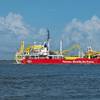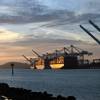Cruise travel from Broward County's Port Everglades increased by 13.5 percent this past fiscal year (Oct. 1, 2001 through Sept. 30, 2002), greatly contributing to the Port's overall $9.7 million increase in operating revenue.
A record 3.5 million passengers sailed to and from Port Everglades in the past fiscal year representing a 12.9 percent increase over the previous year. Cruise revenue increased by 26 percent from $20.4 million in FY2001 to $25.6 million. The greatest increases came from multi-day cruises with the number of passengers increasing 24.9 percent from 2.0 million in FY2001 to 2.5 million in FY2002. Single-day cruises decreased by 7 percent from 1.1 million passengers in FY2001 to 1.0 million passengers in FY2002.
Nationally, in calendar year 2001 the cruise industry increased its global passenger carryings by five percent to 8.4 million passengers and increased direct spending by the cruise lines and their passengers by 6 percent to $11 billion, according to the International Council of Cruise Lines (ICCL), a trade association representing the major cruise lines.
"As one of the world's busiest cruise ports, we are pleased that Port Everglades' cruise business continues to surge ahead at record levels," said Port Director Ken Krauter.
Operating revenue at Port Everglades increased by 12 percent from $79.7 million in FY2001 to $89.4 million in FY2002. Expenditures from operating costs and security amounted to $49.2 million for a gross margin of $40.2 million in FY2002 up 7.9 percent over the previous fiscal year. Total waterborne commerce, however, decreased from 23.7 million tons in FY2001 to 22.7 million tons in FY2002.
Petroleum traffic declined in FY2002, primarily due to reduced demand for jet fuel resulting from decreased air travel after 9/11. Total revenues from petroleum decreased by 2 percent from $19.1 million in FY2001 to $18.7 million in FY2002. Petroleum throughput decreased by 5 percent from 117.9 million barrels and 16.8 million tons in FY2001 to 112.4 million barrels and 16.0 million tons in FY2002.
Petroleum and its byproducts account for 27.4 percent of Port Everglades' total waterborne-generated revenue. Demand for petroleum products is driven by the local economy as the Port provides petroleum to 12 regional counties and all the jet fuel requirements for Fort Lauderdale-Hollywood International Airport, Miami International Airport, Palm Beach International Airport and the Homestead Air Reserve Base.
Gasoline shipments were down by 0.6 percent from 60.4 million barrels in FY2001 to 60.0 million barrels in FY2002. Jet fuel also declined by 16.5 percent from 28.3 million barrels in FY2001 to 23.6 million barrels in FY2002.
Containerized cargo decreased by 11 percent from 621,421 TEUs (twenty equivalent units, which is the industry's measuring standard) in FY2001 to 554,041 TEUs in FY2002 due to adverse changes in some of the Port's shipping services. However, revenue increased by 16 percent from $15.6 million in FY2001 to $18.0 million in FY2002. The Broward County Board of County Commissioners, the Port's governing body, voted to keep tariffs at the same rate without increases for the coming year, and introduced a new container tariff incentive program, which is now attracting increased business.
Port Everglades also derives revenues from non-waterborne sources including real estate and its Foreign Trade Zone. Real estate revenues from office space rentals, leaseholds and related charges, increased by 5.3 percent from $11.8 million in FY2001 to $12.4 million in FY2002.
Activity at Foreign-Trade Zone #25 at Port Everglades increased by 13.0 percent from $327,526 in FY2001 to $369,955 in FY2002. The FTZ provides companies with the opportunity to defer, reduce or even eliminate U.S. Customs duties on products that are imported to the zone and then exported out of the United States.
Featured videos

Tracking Foreign Vessels Working in the U.S. Jones Act Market

Inmarsat Enhances Service to Drive Digitalization

Inside the Electrified Truckable Tug
Subscribe for
Maritime Reporter E-News
Maritime Reporter E-News is the maritime industry's largest circulation and most authoritative ENews Service, delivered to your Email five times per week








